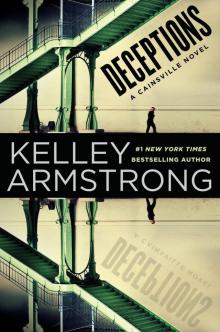- Home
- Anna Porter
Hidden Agenda Page 21
Hidden Agenda Read online
Page 21
“Are the kids all right?” Marsha asked, switching away from discussion of the manuscript.
“Sleeping. They’re both in shock. I haven’t told them about the threats. They think they were picked up by mistake. It’s what the kidnappers said. For now, they believe that, but they may not for long. And I can’t even call the police for help…”
“Do you think your phone is bugged?”
“I don’t know. It could be…”
“Why don’t you take them to New York? They have every reason to need a holiday. So do you. Call Jerry for the keys. Go see the Statue of Liberty, hang out in Central Park, do some shopping. Try the galleries. There’s an exhibition of primitive art at the Guggenheim, you’ve never been to the Bronx Zoo…”
“Right. That’s exactly what I was thinking of. But what about you?”
“I’m going to be fine,” Marsha said, far less certainly than she had intended. “I’ll phone you later. I must run now. There’s a 7:00 a.m. flight. I’ll be your first call in New York.”
Marsha didn’t want to be late for her appointment. The manager informed her the new room was ready. Was there anything else he could do for her? Yes, there was; she packed the manuscript into her canvas bag and asked the manager if he would accompany her to the National Gallery. She was afraid to go alone.
Twenty-Seven
MARSHA ALLOWED THE manager to leave her only when they reached the Italian Seventeenth Century. The gallery was full, the paintings well guarded. In Room 32 she found a comfortable place to wait. Now it was up to “The Dealer” to find her.
Sitting on one of the soft leather settees opposite Philippe de Champaigne’s resplendent portrait of Richelieu, she pulled out “Untitled” and placed it carefully on her knee.
The twenty-five pages Eric Sandwell had copied were headed A Note to the Publisher, and began by appealing to the publisher’s sense of self-importance.
“Every once in a while a publisher of worth and reputation will come across a manuscript that has to be published, no matter how great the risk. The Pentagon Papers was such a publication. The transcript of Richard Nixon’s White House tapes was another. Those books had a profound influence on public opinion, and, therefore, on history.” It went on to list other influential books, including QB VII, Black Like Me, Cry the Beloved Country, even Mein Kampf and Das Kapital.
“The manuscript you hold in your hand is as explosive and as daring as its predecessors, and its publication requires courage, speed and the conviction that the end, however noble, cannot justify the means.
“It is the story of three men who have set themselves the unenviable task of saving the world. When you consider how frequently this same virtuous impulse had catapulted the world into disaster, you will recognize the urgency of this book. Think about Hitler’s plan for an Aryan Utopia, Lenin’s for the Marxist solution, Mohammed’s of a holy empire, ready for the feet of God, the Ayatollah Khomeini’s dream of a land cleansed of sinners…”
Marsha looked up from the manuscript but saw only gallery-goers stopping at one painting or another. The guards had lost interest in her.
“These three men are ideologues, all the more dangerous because they are sincere. Their equipment is persuasion. Their strength, as Hitler’s was, is words.
“They first met at Harvard in 1965. They were the same age, had similar homes, had been pampered as children, spent years in the best private schools and would each inherit substantial fortunes. They all had expectations of wielding considerable personal power and financial influence once they graduated. All three had excelled in philosophy and history. They had read a lot and experienced very little.
“It was the middle of the Sixties. They became interested in politics, particularly the politics of our polarized world—the Western democracies against the Soviet bloc. They studied the options and concluded that a third world war was inevitable. They jointly wrote a paper on nuclear war and its all-too-obvious consequences. Naturally, they became involved in the peace movement.
“Much to the discomfort of their prominent parents they took part in peace demonstrations, marches, campus rallies (not at Harvard) and set up a fund for the defense of draft dodgers.
“They were twenty-five years old, enrolled at the graduate school to learn to be leaders, to gain the knowledge necessary to manage their inherited wealth. Their parents threatened to cut them loose if they continued to indulge their passion for the peace movement, and they heeded the threat. What had been a relatively harmless expression of their shared frustration at the possibility of nuclear war and their own inability to prevent it, now took a carefully planned, if clandestine, form. They resolved to find a way to prevent the coming destruction.
“They studied both armed camps, their strengths and weaknesses. They concluded that of the two, the West was more vulnerable, more capable of changing course. Their study of the East bloc characterized the USSR as a machine in a state of permanent military mobilization since 1945, fueled by a party hierarchy that held its power as closely as any feudal monarchy and declared its objective as the victory of universal communism. Nothing short of a successful internal revolution would steer the hierarchy from its chosen path.
“The Western democracies were more vulnerable to change precisely because they were democracies. Their destiny is, in the final analysis, determined by the opinion of their people. Their governments are installed and rejected by their people. In an era of mass communications public opinion can be influenced.
“The BREAD manifesto was born out of these two assessments. It is a brilliant and coherent piece of work, bearing witness to the considerable abilities of the three men.
“Strangely, BREAD is signed in blood. Though over twenty years have passed, the three signatures are plainly legible.
“BREAD is a symbol for the Savior. It is also the biblical rite of passage to eternal life. Bread and water maintain mankind. It is the simple means for survival. It is universal. It has mythical and healing qualities. It is also short for ‘Better Red than Dead.’ ”
Bread. The word the woman at F.A.O. Schwarz had used. Marsha realized with a start just how much the woman had thought she and Judith already knew.
The room had grown noisy around her. A group of American tourists were focusing on “The Adoration of the Golden Calf,” as their leader finished his impassioned plea for them to remember the classical movements of the figures until they reached Room 9 on the other side. That would enable him to demonstrate to them how Titian had influenced Poussin. The group moved on to block Marsha’s view of Richelieu, and she thought it was time to move.
She settled in Room 38, partly because she admired Tiepolo, but mainly because she liked the room’s two exits, one of which led directly past three uniformed guards into the crowded gallery shop. She assumed there were too many witnesses here for an attack.
X’s Note to the Publisher contained a short excerpt from the BREAD manifesto. It was intensely serious. It stated that the survival of the human race as a principle took precedence over the preservation of the principles of democracy, and that a man, if given the option, should sacrifice freedom for life, since without life there were no freedoms.
“The three men agreed to mobilize all their means in the service of BREAD. They would gladly exchange the inheritance of their children for an assurance of their lives. They called it ‘their heritage of life’ and agreed to give up their own lives, if necessary, to procure it.
“Their plan was boldly simple. They would effect major changes in public opinion in the West, changes that would lead to unilateral disarmament. Having set the target, they had several interim steps to take.
“They had to erode public awareness of the values that divide the totalitarian system of the Communist world from the pluralistic systems of the West. They would have to convince the majority of people that these differences were slight enough to be overlooked and that they should be overlooked in the interest of avoiding a nuclear confrontation.
“Nuclear
war itself had to be brought into public consciousness as an ever-present threat; it had to be seen as the ultimate evil. People would have to be forced into recurrent and endless visions of a world devastated by nuclear explosions, flames raging through ruined cities, thousands and millions dead, of a few survivors stumbling about in toxic darkness envying the dead.
“Equally important, the public had to be distanced from its old-style politicians and its military had to be presented as the enemy.
“The United States had to be isolated from its allies. The most powerful of the Western nations, it would have to be seen as belligerent, expansionist and irresponsible, its military simultaneously blind to the realities and trigger-happy. In 1965, with the Vietnam War escalating, it was not difficult to see how such a picture might take shape.
“Yet Kennedy was still a national hero cut down in his prime and the Missile Crisis was still seen by many as a confrontation won rather than as a close encounter with the end of the world. The three idealists had a long way to go.
“The last of their interim objectives was a public relations face-lift for the USSR if being ruled by it was to be presented to people in the West as a viable alternative to annihilation.
“Like most grand gestures, the manifesto should have been doomed to failure, but these men were not ordinary men. They had the money and the determination to put their plan into action.
“To influence public opinion, they would use the media in all its manifestations. Systematically, they would buy newspapers, magazine and publishing houses, television stations, radio stations and news agencies. They would finance films and support studies pertaining to the aftereffects of nuclear war.
“The reason for this book is that they have succeeded admirably and are poised for the last stage of their objective.
“Today these three men own or control one hundred and twenty-one US, seven British, three Australian, two Canadian and fifteen European daily newspapers, three news agencies, forty-two radio stations, four television stations, four book publishing houses, and the Boston communications giant CFT.
“Their newspapers include many of the largest in circulation and many of the most influential. Their combined readership tops 245 million.
“One of the three recently purchased the Chicago all-news channel CGB, and added to his holdings USA Now, the weekly newsmagazine, and Women’s Voice. He owns two New York publishing conglomerates: Galloway and Brooks, the multinational educational and reference book publisher, and McTavish and Company, the mass-market paperback house, number three in the US rankings of paperback houses. In 1980 he purchased La Presse in Paris and a six-paper German chain from Droer G.
“He has fulfilled his mandate as set forth in the records of BREAD’s annual review meetings. This year he is to expand into Italy. His name is Ethan George MacMurty and he is running for governor of Massachusetts.
“The second man branched into the United Kingdom. His holdings include The Manchester Telegraph, The London News, The Glasgow Enquirer and The Liverpool Daily News. With his board of directors, he has majority ownership of three British radio stations as well as News Only. In June of 1984 he added to his growing portfolio the former Thompson showpiece, The Sydney Gleaner. With it, he purchased Australia Today magazine, two Melbourne radio stations, and FIGMENT, the Australian News Agency.
“He is Nelson Roberts Jr., the reclusive Wyoming millionaire, founder of the Benevolent Society for Helping the Poor of America, occasional SPCA benefactor, renowned patron of the arts, and chief supporter of a host of charities. Last year, Mr. Roberts set up the Roberts Foundation, to be administered by the Des Moines Archdiocese of the Roman Catholic Church of America. Its chief mandate is to support scientific studies of the post-nuclear-war planet. They are presently involved in a $6 million study of ‘nuclear winter’ and plan to offer assistance to the US government’s five-year study series of the same subject.
“The group of three is completed by Anthony Billingsworth-Powell, his father an august member of the British House of Lords and himself much admired for his forthright opinions on labor’s entrenched right to strike, at no matter what cost to the public. It is Mr. Billingsworth-Powell’s US company that took control of The Miami Sun, The Baltimore Register, The Orlando News and twenty other papers when they made their bid for the struggling Teasdale chain in June of 1980. Cinworld, one of his offshore holding companies, established itself as the head of the BAND conglomerate. In addition to being America’s largest manufacturer of sugary breakfast cereal, BAND also owns five radio stations, CHEX in Los Angeles and MUTV in Detroit.
“Sir George Billingsworth-Powell is seventy-five years old. His son, Anthony, may soon inherit his seat in the House of Lords.
“Through all these years, they have never tired of their quest. At annual meetings, they drew up plans of action and specific goals. They reviewed their progress and examined their combined portfolio.
“This book traces how they have affected public opinion on subjects as apparently diverse as NATO, missile testing in Canada, CIA activities in Central and South America, US involvement in Cambodia and the subsequent downplaying of the genocide by the Khmer Rouge, US deployment of a space-based defense system against USSR missiles. It is a measure of their success that public opinion put an end to the president’s budget for Star Wars weapons (a favorite phrase of BREAD media). They wanted minimal coverage of the Soviet-directed pacification of Lebanon and Afghanistan. Their efforts to present the US as warmongering in Central America have caused public outcry against further aid to the contras of Nicaragua and the Salvadoran army. No one will mourn the passing of democracy in El Salvador.
“In Egypt the United States is to be seen as the immoral aggressor, blindly supporting the excesses of the Saudis and of Israel, sowing the seeds of suspicion among Arabs. An Egyptian ship had been attacked by F-100s and set afire. The planes were crudely disguised as Libyan—they were sure to be recognized as American.
“An attempt on Castro’s life was to have been presented as another CIA plot, a final attempt to put the Bay of Pigs right. As the situation in the Philippines grew tenser, the United States’ presence on the side of the oppressor was to be seen as blatant, uncontrolled CIA meddling. Would the Senate stand by while the CIA once more interfered in the internal politics of a nation where democracy had become a Yankee joke?
“In Europe and the United Kingdom, the United States is to be seen as an irresponsible cowboy, ready to sling Pershing IIs at the well-mannered Soviets. And no matter who fires first, the Europeans must know they are hostage to what happens next.
“Through a careful choice of publishers, editors, managers, producers, presidents, directors and other staff—puppets mostly, unaware they are dancing to anyone else’s tune—these three men have been able to determine how news will be covered and what news will be picked for coverage. On the agenda of discussion groups and among articles in the popular press there are questions no one would have raised even five years ago. Questions such as: ‘Should the United States defend Western Europe?’ ‘Should NATO be disbanded?’ ‘Can CIA subversion in Cuba be stopped?’
“There have been films, books, articles, series on the effects of a nuclear holocaust too terrifying to contemplate, and audiences, still in a state of shock, are now being treated to interview shows and learned panel discussions on the relatively unimportant differences between our world view and that of the Soviets, and the obvious advantages of unilateral disarmament.
“Hence the urgency of this publication.
“If these men are to be stopped, their methods must be understood. Their chosen public arena must be accepted. After the appearance of this book, the other media, not now controlled, will rally. Those who read will read, those who do not will be treated to entertaining pieces of the story on television. They will have a choice whether to listen or not. Ultimately the decision rests with the people.”
“Isn’t it simply wonderful?” said the voice over Marsha’s shoulder. �
��No question, the Venetians had it over everybody when it came to painting. Maybe it has something to do with living in a crumbling city. It reminds one constantly of mortality.”
Quickly Marsha slipped the manuscript into her carrier bag and stood up.
“Look at this one. Here is Venus handing over a child to winged Time. The baby is already marked for death: there is a deep sadness in the eyes. I think maybe you will remember me from Schwarz’s. Yes?” The voice, flat, mechanical, precise. The same pink and blue scarf over her head. In deference, however, to London’s spring, she must have left the sealskin coat behind.
“You are an extraordinarily resourceful young woman. And enterprising. Far beyond anyone’s expectations.” She put the emphasis on “anyone’s” and stretched out the word so as to make sure she herself was included in the wonder at Marsha’s enterprise. The teddy bear eyes behind the elaborate horn-rimmed glasses remained fixed on Tiepolo’s “Allegory with Venus and Time.” The expression was pleasantly benign.
“Delighted to gain your approval,” Marsha said, implying that she wasn’t. “But isn’t it perhaps time you stopped talking in riddles and told me who the hell you are?”
“Showing your claws a bit, my dear?”
“If you want something, say it now, or I’m going to call that guard over there and tell him…”
“Tell him what? That this little old lady is molesting you? However, you are right. The time has come to stop playing games. The Dealer is ready to meet you. You have something that belongs to him.”
“I do?”
“In that bag, Miss Hillier.” She sighed. “I thought you were tired of games. Now, if you will come with me, I shall take you to him. Do not worry about the two men following us; they are here to protect you. You’ve given them a lot of work already.”
Marsha looked around. She saw a stocky, dark-haired man nearby, his back to her. He appeared to be absorbed in a close study of Longhi’s rhinoceros.

 Deceptions
Deceptions Hidden Agenda
Hidden Agenda The Appraisal
The Appraisal Mortal Sins
Mortal Sins In Other Words
In Other Words